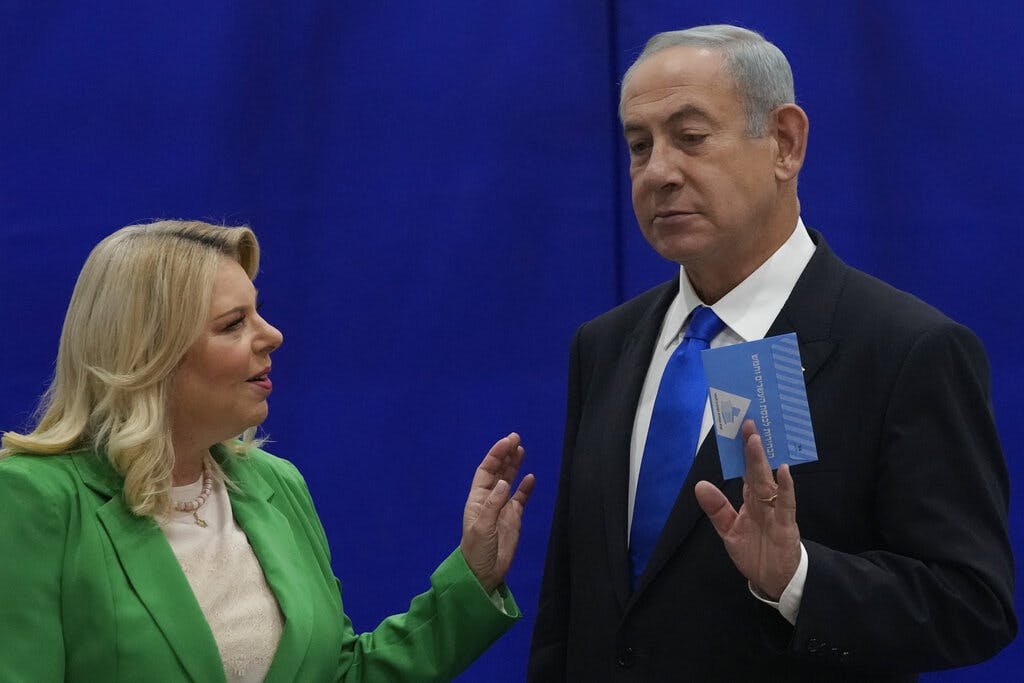Israeli Politics Takes a Sharp Right Turn
A repackaged far-right candidate, Itamar Ben Gvir, is the big winner in today’s election along with Benjamin Netanyahu, who may yet may rue his move to pull the former fringe politician out of the shadows.

The big winner in today’s Israeli election — beside Benjamin Netanyahu, the former and likely next prime minister — is a repackaged far-right candidate, Itamar Ben Gvir.
Until last year, Mr. Ben Gvir, an heir to the late Rabbi Meir Kahane, was considered a negligible fringe politician. Now, with 15 projected Knesset seats, he is a rising force in Israeli politics. His party, Religious Zionism, is emerging as third-largest in the Knesset, according to exit polls, indicating a sharp right turn in Israeli politics.
One of the country’s largest broadcast networks, Kan, projected that a bloc headed by Mr. Netanyahu and composed of nationalist and religious parties would capture 62 Knesset seats — more than half of the 120-member body.
If these results are accurate, they would give Israel a stable government coalition for the first time in the five election rounds that have taken place since 2019. “It’s a good start, that’s all I can say right now,” Mr. Netayahu said shortly after exit polls projected his victory. He then went on to conduct a conference call with the heads of the main parties in his likely bloc.
Mr. Netanyahu, whose Likud party will be the largest in the Knesset, with 30 seats, now has a much easier job of cobbling together a durable coalition that could keep him in power for the next four years. The biggest challenge he will face is how much power to give to Mr. Ben Gvir.
A much more careful politician than his critics admit, Mr. Netanyahu would rather pull defectors from the camp that ran on the “anything but Bibi” slogan than turn Mr. Ben Gvir into his top partner and perhaps even an heir. Mr. Ben Gvir is even more hated by the Israeli left and centrist voters, as well as many on the center right, than Mr. Netanyahu.
The former prime minister, for one, has served in an elite military unit; Mr. Ben Gvir’s army service, in contrast, is sketchy at best. He also was convicted in 2007 of racist incitement. While he has mellowed and lowered his tone, Mr. Ben Gvir’s top draw remains his advocacy of tough measures against Arab terrorism.
He once adorned his apartment with a photo of Baruch Goldstein, a doctor turned Jewish terrorist who had killed 29 Muslim worshippers inside the cave of the Patriarchs at Hebron merely for being Arabs. Today, in contrast, Mr. Ben Gvir says, “I don’t hate Arabs, I hate terrorists.” Yet, nearly half of all Israelis consider him a political pariah.
If Mr. Netanyahu wins, his ruling coalition would include the “racist, convicted criminal Ben-Gvir, a Meir Kahane’s disciple,” Gilead Sher, the chief of staff for another former prime minister, Ehud Barak, tweeted before the exit polls were issued, in a widely shared statement of revulsion of the nationalist’s rising star.
Yet, young voters, residents of towns far from the central urban sprawl of Tel Aviv, and many who have grown tired of the cautious approach to Palestinian terrorism warmed to Mr. Ben Gvir’s message. His rhetoric gave him the halo of a security hardliner best suited to combat recent attacks at Israeli towns.
In a result that stunned some election observers, Mr. Ben Gvir’s tough guy image won his party more seats than the National Unity party, which is headed by the current defense minister, Benny Gantz. Mr Gantz was an army chief of staff, and his party was filled with former generals and heralded security stars.
After aiming to capture the premiership in this election round, Mr. Gantz’s political career is now in peril. Yet, he could make a political U-turn by joining a government headed by Mr. Netanyahu. The projected premier would love to accept him and some former Likud members who have rejected him in order to blunt Mr. Ben Gvir’s power.
Offering Mr. Ben Gvir an important position in government is likely to be criticized in European capitals, as well as in Washington. Voices in Arab countries that have made peace with Israel in the Abraham Accords, including the United Arab Emirates, have warned against damage to relations resulting from Mr. Ben Gvir’s ascent.
Prior to the election, Mr. Ben Gvir said that if the right wing bloc won he would demand to become minister of internal security, which has raised fears among Israeli Arab voters. Yet, even if Mr. Netanyahu gives him that portfolio, the far-right politician may have less power than expected.
In past governments, Mr Netanyahu took powers away from ministries, such as the foreign office, by cutting budgets. Similarly, he could name Mr. Ben Gvir to the internal security job but then proceed to take away many of that office’s responsibilities.
Yet, the Kahana heir who as late as last year’s election was merely a fringe politician is now a force to contend with. Mr. Netanyahu may yet rue his move to pull Mr. Ben Gvir out of the shadows.

